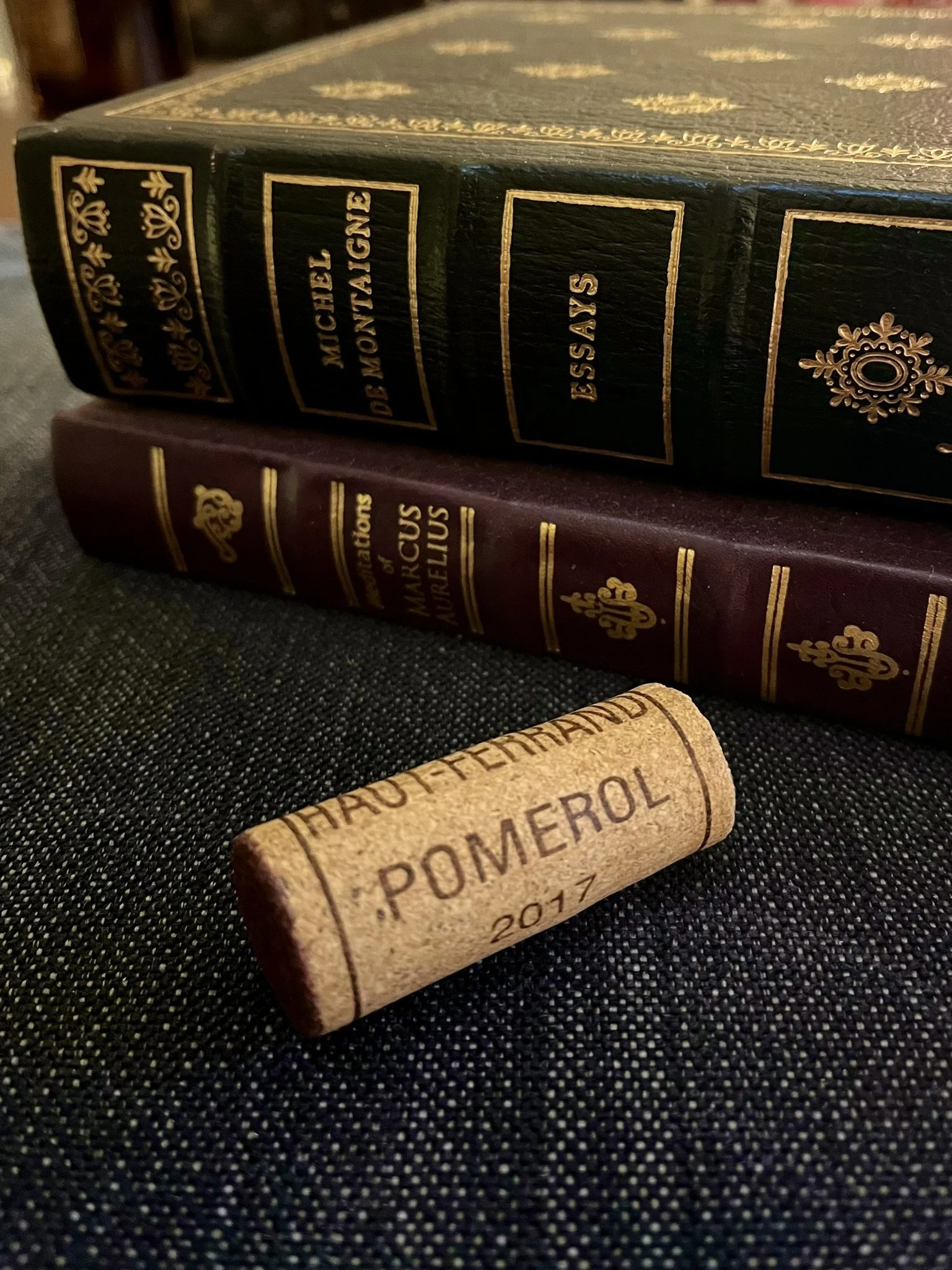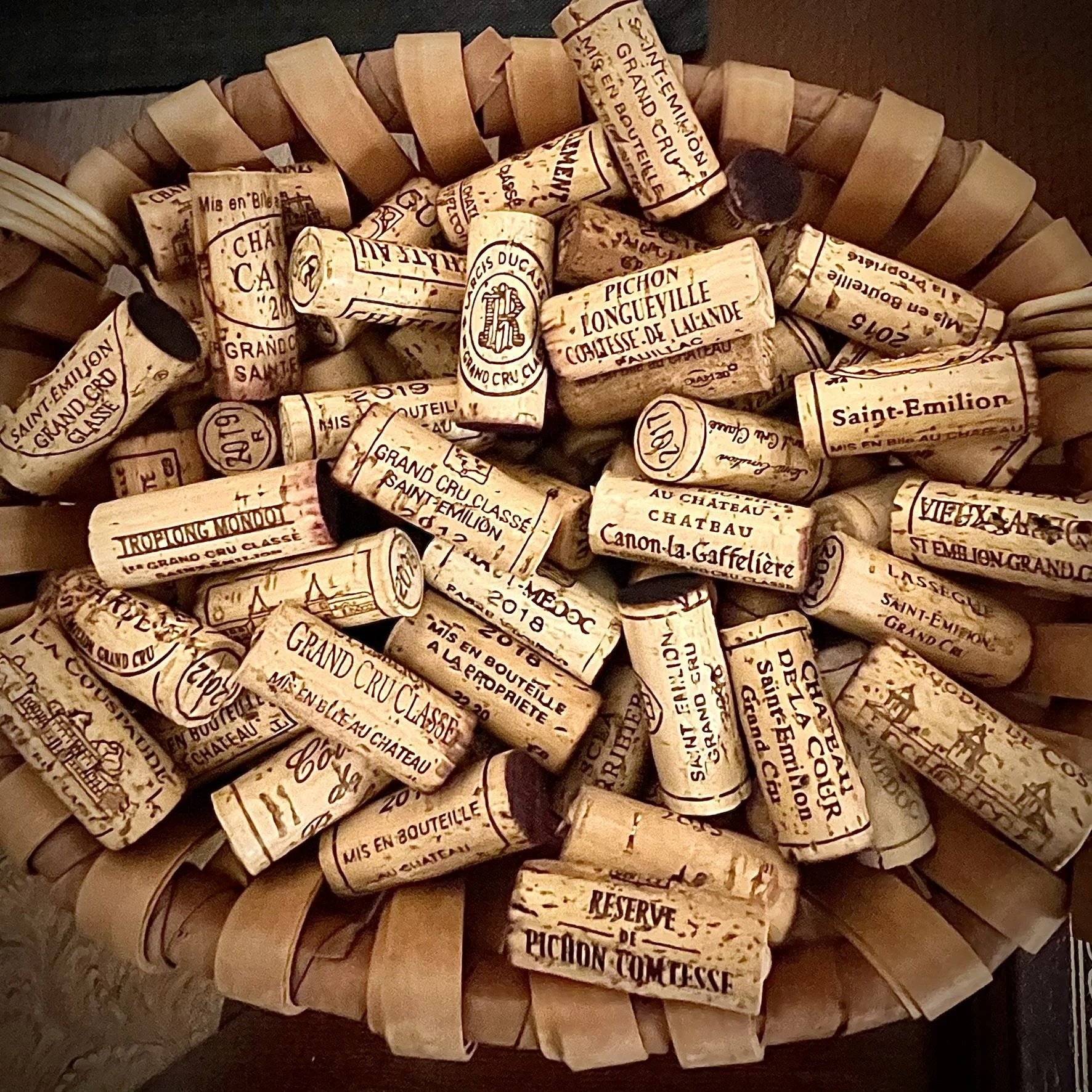6e Pensée: An Ode to the Humble Cork and the Philosophy of Quiet Nobility
The cork of a 2017 Château Haut Ferrand, which accompanied the writing of this post. 29 March 2025
The journey of a wine cork begins in the bark of an ancient oak, harvested from trees that have stood for generations. Stripped, shaped, and prepared, it serves no grand purpose, no claim to fame—only a simple, unwavering task. In the grand theater of wine, the cork assumes its supporting role in the shadows, far from the spotlight—silent, steadfast, and unseen—like a quiet sentinel guarding the performance of something far greater. Unlike the gleam of a bottle’s glass or the flourish of a well-designed label, the cork asks for, nor receives, much attention. Yet, it holds within it a quiet nobility, the unsung hero of the bottle. Without it, the wine would be exposed to the elements, to air and light, decaying before its time.
Pressed deep into the neck of the bottle, it seals within it the slow alchemy of time. The sheltered wine will begin its transformation, evolving with the passage of time, yet the cork remains indifferent to what it guards.
Marcus Aurelius wrote, “Do not waste what remains of your life in speculating about others… Instead, be concerned with how you live your own.” In this manner, the cork embodies the Stoic philosopher—it performs its duty without demand for recognition or self-importance. It does not concern itself with whether it serves a humble table wine for a fleeting evening of laughter or a treasured Grand Cru Classé, reserved for a special moment yet to come. It neither envies nor exalts the liquid it was tasked to preserve; for its duty is its own, separate from the contents of the bottle.
There is grace in this noble detachment—not the cold absence of feeling, but a steadfast commitment to purpose, unshaken by distraction. It protects the wine but does not smother it. It guards, yet never imprisons.
Montaigne mused, “Un homme devrait être capable de tout faire, mais il ne devrait s’attacher à rien.” ("A man should be able to do all things, but he should attach himself to none.") The cork, too, is impartial. It holds back the wine but does not cling to it. For what is life, if not a series of openings and closings, of arrivals and departures? To cherish the moments we are given, yet not mourn their passing.
When the time comes—not of its choosing—a hand reaches for a corkscrew. It is pierced—the sharp screw twisted deep into its heart. With a soft pull, it yields without resistance. The moment of its departure is its quiet triumph—a soft sigh sounds: at once its only greeting, as well as its farewell, as it is drawn from the bottle and the wine is released. In this mere instant, its long, patient service reaches its end. There is no struggle, no regret.
While all attention turns to the wine as it is poured into glasses, the cork is unceremoniously set aside. Yet, it does not mourn its removal, nor does it wish to stay beyond its time. It understands what so many fail to grasp: that all things must pass, and there is honor in knowing when to let go.
It lived withstanding the pressures of time and expectation, knowing that its role is transient. Like the wise, who embrace the impermanence of life rather than lament it, it understands that dignity is not found in grasping but in the graceful acceptance of one’s fate. True nobility in life is not found in recognition but in the quiet mastery of one’s purpose. It is in doing what must be done, not for any praise or adulation, but because it is right—standing firm when needed, yet knowing when to bow out with grace when its task is accomplished. Thus, it fulfills its role with a quiet serenity, knowing that service itself is its own reward.
As time gradually transformed the wine it safeguarded, the cork too underwent a subtle change. Once removed, it bears the mark of its duty—the deep stain of wine it never tasted, the lingering trace of time, a silent testament to its service, worn like a badge of honor. Some corks are kept as mementos, tucked away in drawers or displayed on bookshelves, treasured like relics of beautiful nights and heartfelt conversations. Most, however, are discarded as afterthoughts, forgotten as soon as they are pulled. But does the cork despair? No. It has served, and that is enough. The cork does not measure its life by how it is remembered. It does not seek to be treasured, nor does it lament being forgotten. It understands that the worth of its existence is not in how it is preserved, but in how well it has preserved.
The Silent Ones Who Hold the World Together
How many unsung souls live as the cork does, laboring in silent devotion, unnoticed and uncelebrated, yet utterly essential? Those who support families, stabilize workplaces, and care for the weary. They work without thanks, nurture without glory, and love without seeking reward. They do not ask for applause, nor do they demand recognition. They carry on in their duty with steadfast dignity. I think of the teacher who spends extra hours shaping young minds. The caretaker who remains at their post when others have gone home. The friend who speaks little but listens deeply, offering attentive presence in place of grand words.
Like the cork, their work often goes unseen, yet without it, everything would falter. If the world, in all its beauty, is to be celebrated like a fine wine, poured with admiration, it is these individuals—like the humble cork—that preserve its essence, ensuring its beauty endures through time.
We live in an age that rewards spectacle, where being seen is often valued more than being steadfast. The world chases the loud, the dazzling, the fleeting, mistaking glamour for substance. But nobility—true nobility—has never been found in mere appearances. It is not in grand gestures or fleeting fame, but in those who persist in their duties even when no one is watching. It is found in the hands that mend, the voices that soothe, the hearts that endure.
These silent souls never seek the limelight, yet they are the steadfast pillars on which everything rests. They do not live for reward, but like the humble cork, their reward is woven into the fabric of all they sustain. Though the world seldom acknowledges them, without their quiet presence, it would decay and unravel.
And so, let us raise our glasses—not just to great vintages, but to the humble cork, the quiet guardian of what is treasured. To those who selflessly serve with unwavering duty—steadfast, unassuming, and essential—holding everything together, offering no fanfare-only purpose, their nobility found in the humble course of silent service. L'élégance du cœur se mesure à sa capacité à servir sans attendre. Santé.
Some of the corks from my wine journey.

